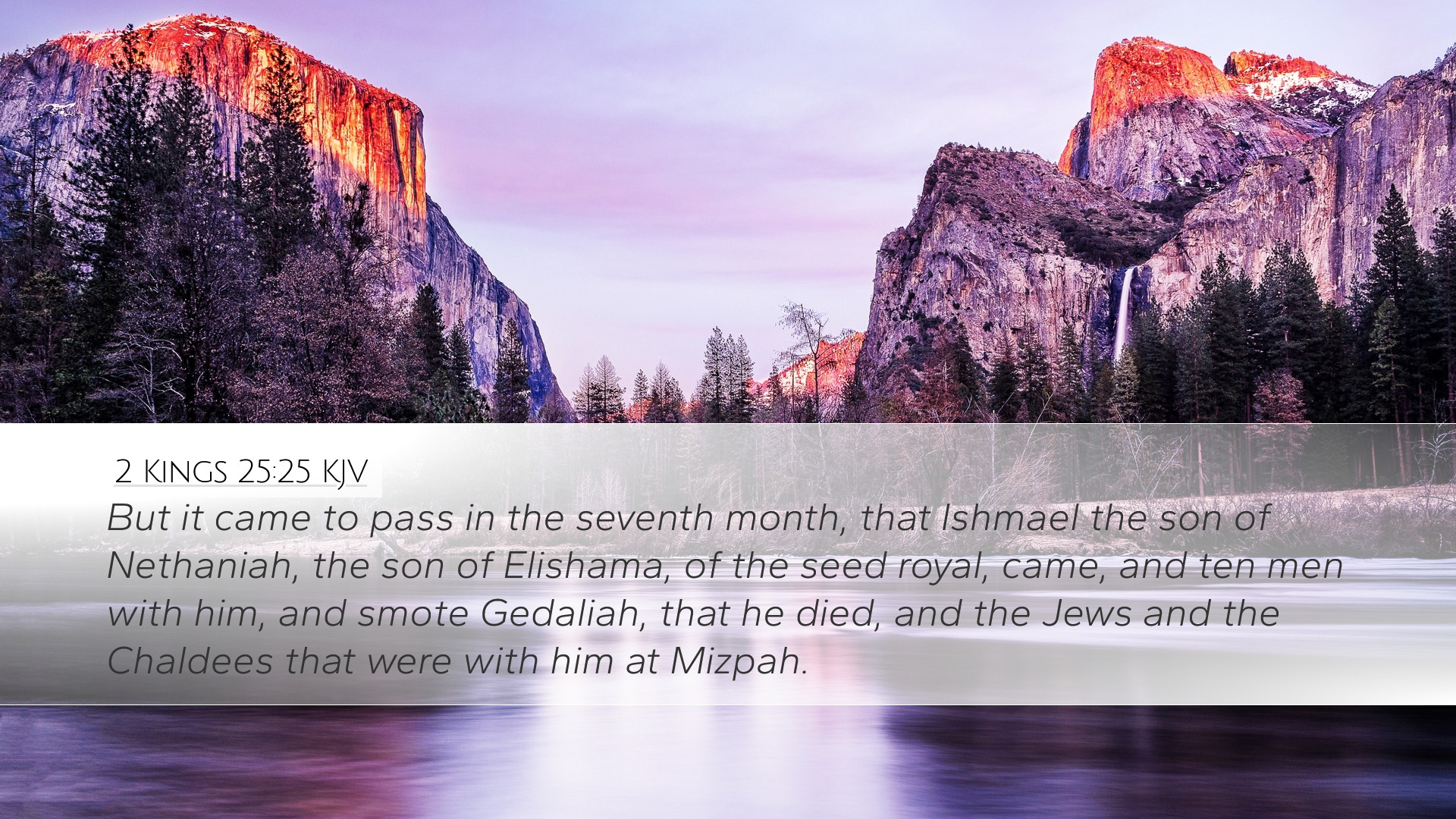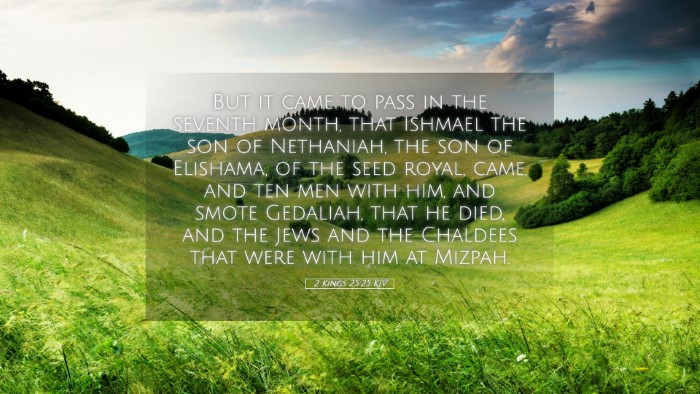Commentary on 2 Kings 25:25
Verse: "But it came to pass in the seventh month, that Ishmael the son of Nethaniah, the son of Elishama, of the seed royal, came, and ten men with him, and smote Gedaliah, that he died, and the Jews and the Chaldees that were with him at Mizpah." (2 Kings 25:25)
Introduction
This passage captures a pivotal moment in the history of Judah, marking the tragic end of Gedaliah, who had been appointed governor of Judah by the Babylonian king Nebuchadnezzar following the fall of Jerusalem. The act of Ishmael, a member of the royal family, highlights the instability and factionalism that plagued the region during this tumultuous period. This commentary seeks to explore the motivations of Ishmael, the implications for the Jewish remnant, and broader theological themes evident in this tragic narrative.
Historical Context
The context of 2 Kings 25:25 is critical for understanding the events that unfold here. Following the destruction of Jerusalem in 586 B.C., Nebuchadnezzar appointed Gedaliah to govern the remaining people in the land. He symbolized a fragile hope for the Jewish survivors, who were still reeling from the devastation of their nation.
Public domain commentators like Matthew Henry emphasize Gedaliah's role as a stabilizing figure amidst chaos. His leadership was intended to maintain order and facilitate a return to normalcy for a shattered populace. However, the actions of Ishmael represent the dangers of political fragmentation and betrayal that characterized this era.
Character Analysis: Ishmael and Gedaliah
Albert Barnes points out that Ishmael, being of the "seed royal," likely acted out of a sense of entitlement and ambition. His assassination of Gedaliah serves multiple purposes: it was a power move, an assertion of royal bloodline legitimacy, and a reaction against Babylonian authority.
On the other hand, Gedaliah is depicted as a man of integrity who sought peace and survival for his people. He sought to dissuade his compatriots from their fears of Babylonian intentions, urging them to remain submissive to their new rulers. The tragic irony is that his good intentions led to vulnerability, as his position also made him a target for dissenters like Ishmael.
The Act of Violence
The assassination itself is significant. Adam Clarke notes the violence of this act not only serves as an indication of the lengths to which political rivals will go but also the moral decay that had overtaken the remnants of Judah. Ishmael’s choice to murder Gedaliah can be seen as emblematic of a broader rejection of God’s appointed leaders, reflecting a deeper spiritual crisis among the people.
This act of violence results in further bloodshed and instability, leading to a sense of hopelessness among the Jewish people. Gedaliah's death opened a pandora's box of fear and distrust, leading many to flee to Egypt in search of refuge, indicating a loss of faith in divine providence and earthly governance alike.
Theological Implications
This passage raises profound theological questions regarding the sovereignty of God amid human action. As pointed out by Matthew Henry, even in these tumultuous events, God’s overarching purpose remains intact—He is working out His will through the chaos of human sin and political intrigue.
The assassination could be interpreted as part of God's judgment against Judah for their persistent rebellion and idolatry, a theme prevalent throughout the historical books of the Old Testament. The fall of their city and the execution of their governor serve as stark reminders of the ramifications of abandoning God’s covenant.
Lessons for Pastors and Theologians
This narrative challenges pastors and theologians to reflect upon the importance of leadership and the moral responsibilities that come with authority. Gedaliah’s commitment to peace offers a model of servant leadership, while Ishmael’s actions urge a caution against pride and ambition that disregards the wellbeing of one’s community.
- Value of Leadership: Leaders must embody integrity and wisdom in fostering unity rather than division.
- Human Nature: The narrative illustrates the susceptibility of individuals to sin and ambition, a reminder of the need for accountability in leadership.
- Hope amidst Despair: Despite the dire circumstances, this passage encourages believers to trust in God’s providential care, reminding them that God is aware of our struggles and injustices.
Conclusion
In summary, 2 Kings 25:25 presents a somber chapter in the history of a people grappling with loss and betrayal. The tragic assassination of Gedaliah is more than just a historical account; it serves as a theological reflection on the struggle between divine authority and human ambition. As we consider the lessons from Gedaliah and Ishmael’s actions, may we, as believers, aspire towards righteousness, uphold justice, and support God-honoring leadership.


